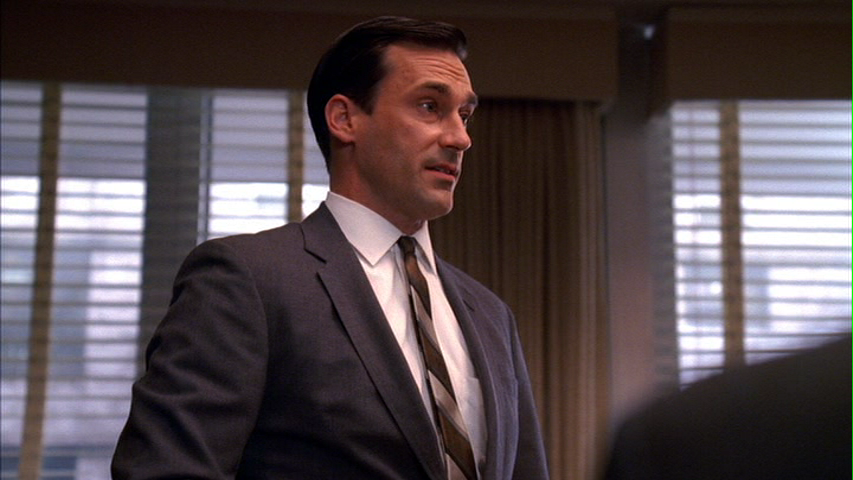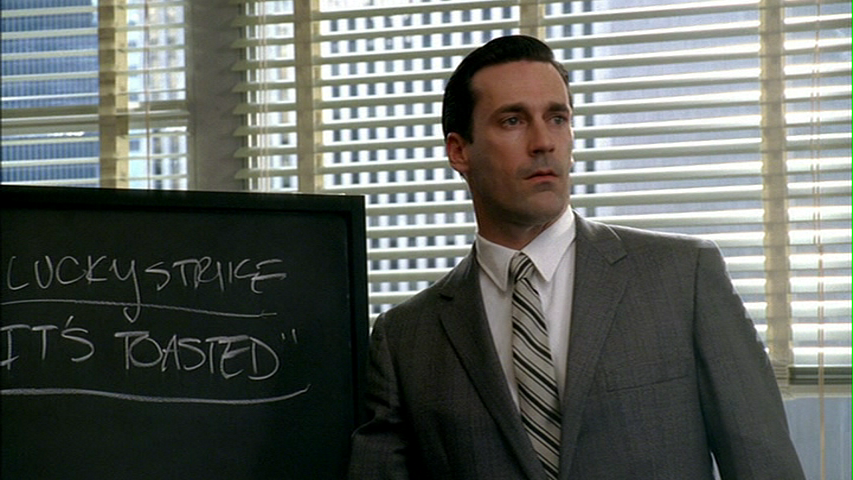This past weekend was Podcamp Montreal 2009 where I delivered a session called Sex, Trust, & Transparency: What Would Donald Draper Blog?
I set out to explore social media, personal branding, and what bloggers and podcasters could learn from Mad Men protagonist, Donald Draper. The audience was great, contributed so much input, and together, we covered so many different aspects of trust & transparency.

Blogging and podcasting are about self expression, about being able to share your ideas without any barriers. They’re about community: building community and joining community. So the question was: How would Donald Draper use Social Media to build his personal brand today?
For starters, Donald Draper wouldn’t whore himself. He’d define his brand and target an appropriate audience give them what they wanted.

Then he’d start off with his brand’s story. A story about what gives him a personality that his targeted audience can connect with. He’d define what makes him unique. What makes him special. What makes him relevant to that targeted audience.
And then he’d fill a demand for what his targeted audience wanted. Not his friends. Not his “connections.†But that defined, targeted audience.
Because as a blogger, his audience would be the client, and Donald Draper has a very intuitive grasp what his clients need. And Donald Draper is very good at respecting those needs and paying attention to them. He wouldn’t neglect those needs just to be a social media rockstar.

He wouldn’t talk about his personal life or what he likes doing on the weekend. And he definitely wouldn’t gossip. Neither of these would do anything to help him fill the demand of his audience.
And this is why Donald Draper wouldn’t be transparent. Sure, he’d share his thoughts about what his audience is interested in. But those thoughts would be calculated and pre-meditated.
Because when it come to building a community around a brand — personal or otherwise — what you call transparency was invented by guys like me to invoice clients for tweets. ;)
Since Donald Draper’s day, brands have transcended the ad industry and extended into our very identities. The idea of a brand has become so entrenched in society that we don’t even have personalities anymore. We have personal brands.
And just as Dick Whitman recreated himself as Don Draper, personal branding let’s us recreated ourselves. So while Donald Draper might not blog, Dick Whitman most certainly would.

So I guess a better question would be: What would Dick Whitman blog? Because let’s face it, as incompatible as Donald Draper’s personality is with the open, transparent culture of social media, he’s just a product.
Donald Draper is the personal brand of Dick Whitman, someone from humble beginnings that wanted to make it big in the big city. And that someone would use any relevant tool available to them, including social media, to create a brand that was relevant to the audience that they wanted to target.
Transparency is one of those terms that people like to throw around, because it implies that if one puts all one’s cards on the table, this action indicates trustworthiness. Businesses should be more transparent, but I agree with you that people should not. After all, transparency also indicates an unfavourable straightforwardness, being able to see through someone who is attempting a façade that they struggle to maintain. Personal branding is not about tweeting what you ate for lunch, as you say, and revealing too much is not good for your brand.
Someone once told me “mystery is sexy,” and the older I get, the more I believe this to be true. As a writer, however, it’s important to figure out which part to tell and which to leave out, because sometimes you need to tell more in order to reveal less. A classic example is in screenwriting, when you must indicate that there is a bomb in someone’s briefcase. You don’t show the bomb, but you show a man with a briefcase, entering a building. You then show the briefcase, the man leaving without his briefcase, and then a building exploding. You don’t ever write the bomb, but you write the events leading up to, and including, the explosion; you write more, but reveal less.
Something interesting that came up in the discussion was the difference between transparency and authenticity. Both of these lend to someone’s trust economy, but they aren’t the same thing.
Of course, your premeditated personal brand is just a character, so that character can be transparent in a way without being inauthentic — i.e. this is what the character would really think. As the man said, all the world’s a stage.
As for mystery, that also came up in the discussion. One of the things that makes Don so appealing is his mystery, and we were wondering how he could leverage social media and still maintain the mystery.
Maintaining the mystery is, I think, much easier for men (not to make this a totally sexist discussion). Women are rather expected to share, and to overshare, and to give personal information easily. They bare their souls as well as their bodies. I was thinking about it this morning: how hard is it to get a man to agree to strip for nude photos, knowing they will be published? It’s practically impossible. Women, by and large, will start undressing the moment the request is out of your mouth. Why? If I knew that, my friend, I would be a rich woman.
Anyway, I guess my point is that men are more used to playing things close to the vest, based on the quirks of our culture, and it just makes me wonder how women can maintain their mystery if it depends on a sense of sex appeal. As for Don Draper, well… I’ve never seen the show, so I have no idea how he retains his mystery, except probably by keeping his mouth shut and stiff-upper-lippin’ it.